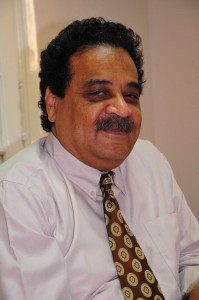
This article’s title was supposed to be “What happens after electing Al-Sisi?” but I changed my mind, and hence the current title. That is because I still have hope that Al-Sisi will choose the third scenario, which includes cooperating with democratic entities to support a certain candidate for presidency. This candidate will also be accepted by the more moderate supporters of the old state.
Now, regardless of who is the next president, the question is: which entities will that president represent and seek to carry out their projects on the ground? To answer that question, I must remind you that there are three political powers on the scene right now: former-regime supporters, Islamists and democrats.
The former-regime supporters may be the ones with the most power and also the ones who are the loudest. They are also the most popular, especially within the state apparatus. They are involved in three projects, reviving the idea of a benevolent dictator, the police state and administrative reform. If we add the democratic state project and the religion state project to the mix, then we realise that there is conflict in Egypt. The army, with Al-Sisi leading it, has the qualifications to make any of these projects a reality. They realise that whatever they pick, they will have to bear its responsibility entirely.
It is also important to realise that they have not forgotten the negative sentiments generated against them due to the practices of Tantawi and the Supreme Council of Armed Forces post the 25 January Revolution. Therefore, they are careful that whatever they do reflects the will of the people.
Even if the next president is not Al-Sisi, he will have the army’s support. He will then have to choose one of the suggested projects with the exclusion of the religion state project. Maybe that is why the former-regime supporters are pushing for Al-Sisi to run for presidency since they see in him a president capable of achieving their project.
If any of the proposed projects do not boast the required popularity on the ground to get the army to support it, then the different political entities will continue to fight over the adopted project. The other possibility is the formation of an alliance.
The political powers that removed the Brotherhood were in some sort of an alliance. This included the democratic entities and supporters of the old state. However, it was an undeclared alliance and it did not try to do anything else beyond the removal of the Brotherhood. That is why the supporters of the old state began to attack the democratic entities, which led to the end of the alliance.








